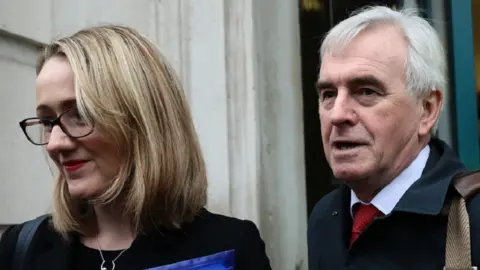
 Getty Images
Getty Images
Seven Labour MPs have had the whip suspended for six months after voting against the government on an amendment to scrap the two-child benefit cap.
Ex-shadow chancellor John McDonnell was among the Labour MPs who voted for an SNP motion calling for an end to the policy, which prevents almost all parents from claiming Universal Credit or child tax credit for more than two children.
Mr McDonnell backed the SNP motion alongside Richard Burgon, Ian Byrne, Rebecca Long-Bailey, Imran Hussain, Apsana Begum and Zarah Sultana.
MPs rejected the SNP amendment by 363 votes to 103, in the first major test of the new Labour government’s authority.
Losing the whip means the MPs are suspended from the parliamentary party and will now sit as independents.
Nearly all of the rebels were allies of the former Labour leader Jeremy Corbyn, who now sits as an independent MP and had put his name to the SNP motion.
In a statement on social media, Ms Sultana said she would “always stand up for the most vulnerable in our society”, adding that the cap would “lift 33,000 children out of poverty”.
Mr Burgon said he was “disappointed” by the decision to suspend him, explaining that “many struggling families” in his Leeds East constituency had raised the cap with him.
Ms Begum said she voted against the cap because it had “contributed to rising and deepening levels of child poverty and food insecurity for many East End families”.
Mr Byrne, meanwhile, said the “best way” to help his Liverpool West Derby constituents living in poverty was to scrap the cap.
Before the vote, Mr McDonnell said: “I don’t like voting for other parties’ amendments, but I’m following Keir Starmer’s example as he said put country before party.”
The decision to remove the whip is an early show of force from the new government.
This is their first rebellion. Even though it is a small one, Labour whips are trying to send a message to MPs that dissent will not be tolerated in votes.
However, there are many more Labour MPs who are opposed to the two-child benefit cap.
Many hope the party will make a decision in the coming months to scrap it.
A government source said Labour’s policy on the two-child benefit cap had been agreed going into the election – and the manifesto commitments made by Labour were clear.
The government has said it is not prepared to make “unfunded promises” by abolishing the cap.
Prime Minister Sir Keir Starmer previously said there was “no silver bullet” to end child poverty but acknowledged the “passion” of Labour MPs on the issue.
The rebellion marks another moment of pressure from Labour politicians on the government to scrap the cap.
Scottish Labour leader Anas Sarwar and Greater Manchester mayor Andy Burnham have also backed calls for a change.
Kim Johnson and Rosie Duffield were among 19 Labour MPs to sign another amendment calling for an end to the cap – which was ultimately not put to a vote.
Several prominent critics of the cap, including Ian Lavery and Nadia Whittome who both signed rebel amendments, abstained on the vote.
Labour veteran and Mother of the House Dianne Abbott did not take part in the vote due to “personal reasons” but in a statement said she was “horrified” MPs had been suspended “when removing the cap is supposed to be party policy”.
Emma Lewell-Buck, Labour MP for South Shields, who put her name to a rebel amendment said she did not vote against the government because “none of the votes taking place tonight would have resulted in scrapping the cap.
In a social media post she said: “There will be an Autumn Budget soon and I know myself and other colleagues will be working constructively with the Government to make scrapping the cap part of it.”
Despite the rebellion, Sir Keir easily saw off the first major test of his government – passing the King’s Speech.
Separately Labour defeated an attempt by the Conservatives to insert an amendment to the King’s Speech promoting Tory policies on defence spending, illegal migration and cutting inflation by 384 votes to 117.
A Lib Dem-tabled amendment which sought to commit the government to focus on crises in the health and social care system, sewage dumping and electoral reform was defeated by 382 votes to 85 – despite receiving support from Reform UK, the Green Party and parties from Wales and Northern Ireland.
Opposition parties customarily try to amend the King’s Speech to include their priorities for the next parliament, though they almost never succeed.
Work and Pensions Secretary Liz Kendall said the government could not tackle the “dire inheritance” from the Conservatives overnight.
However, she said Labour was “determined to make a huge difference” on tackling childhood hardship.
The Institute for Fiscal Studies think tank has estimated that removing it would eventually cost the government £3.4bn a year, roughly 3% of the total budget for working-age benefits.
On Monday, Ms Johnson, who has led Labour calls for the policy to be scrapped, said the government should set out a “clear timetable” for doing this.
“It’s not a question of whether we can afford vital policies to alleviate child poverty, such as lifting the two-child cap, it’s a question of whether we can afford not to,” she said.
“This punitive policy needs to be consigned to the dustbin of history where it belongs.”
Ahead of the vote SNP Westminster leader Stephen Flynn said removing the cap was the “bare minimum required to tackle child poverty – and to begin to deliver the change that people in Scotland were promised.”








